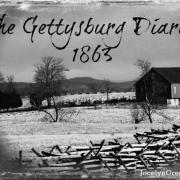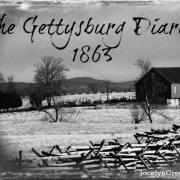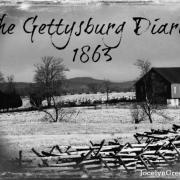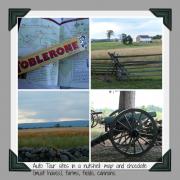Gettysburg Diaries: Georgeanna Woolsey's "Friendly Enemies"
Today in 1863, Gettysburg began to experience a second invasion. The armies had withdrawn on July 4, and now it was time to pick up the pieces of shattered homes--and bodies. Last week I shared the perspectives of housewife Sarah Broadhead and of teenager Tillie Pierce. Today I'd like to share from the perspective of Sanitary Commission nurse Georgeanna Woolsey. The following is excerpted from my nonfiction book, Stories of Faith and Courage from the Home Front:
Friendly Enemies
[[{"type":"media", "view_mode":"media_large", "fid":"671", "attributes":{"class":"media-image alignright wp-image-216 size-full", "typeof":"foaf:Image", "style":"", "width":"124", "height":"179", "alt":"BB-homefront-cover_125"}}]]When the armies moved out, they left behind 21,000 wounded Union and Confederate soldiers. The town of Gettysburg, with its 2400 residents, was taxed beyond their limit to feed, clothe, house and otherwise care for the men. Waves of volunteers from the U.S. Sanitary Commission and the U.S. Christian Commission flooded the town to help, bringing storehouses of food, clothing, and hospital supplies, plus manpower to relieve the townspeople of their nonstop cooking and nursing.
[[{"type":"media", "view_mode":"media_large", "fid":"1287", "attributes":{"class":"media-image size-medium wp-image-2890", "typeof":"foaf:Image", "style":"", "width":"279", "height":"300", "alt":"Georgeanna Woolsey"}}]] Georgeanna Woolsey
Among the Sanitary Commission volunteers was Georgeanna Woolsey, who distributed fresh food and drink to the men on ambulance trains. She recalled:
I do not think that a man of the 16,000 who were transported during our stay, went from Gettysburg, without a good meal—rebels and Unionists together, they all had it, and were pleased and satisfied. “Have you any friends in the army, madam?” a rebel soldier, lying on the floor of the car, said to me, as I gave him some milk. “Yes, my brother is on -----‘s staff.” “I thought so, ma’am. You can always tell; when people are good to soldiers they are sure to have friends in the army.” “We are rebels, you know, ma’am,” another said; “Do you treat rebels so?” It was strange to see the good brotherly feeling come over the soldiers, our own and the rebels, when side by side they lay in our tents. “Hullo, boys! This is the pleasantest way to meet, isn’t it? We are better friends when we are as close as this, than a little farther off.” And then they would go over the battles together: “we were here,” and “you were there,” in the friendliest way.
Many on both sides found it impossible to cling to demonizing rhetoric about the opposing army when they ate and talked together, and slept side by side. Resident Liberty Hollinger later said,
“Many romances were developed during the stay of the soldiers. One of our most intimate friends (a northerner) married a southerner who her mother had nursed back to health.”
As friendships and marriages bonded Yankees and Rebels together, the people hoped the country would soon be reunited as well. Prayer: Lord, help me tear down any division among my brothers and sisters in Christ. “How good and pleasant it is when brothers live together in unity!” ~Psalm 133:1
___________________________
Georgeanna Woolsey's pamphlet, entitled "Three Weeks at Gettysburg", can be read in its entirety online, and provided the inspiration for a few scenes in Widow of Gettysburg. Georgeanna herself was the inspiration for my first novel, Wedded to War, and she does come back to make an appearance as a nurse at Gettysburg in Widow of Gettysburg. The young woman named Liberty Hollinger, quoted in the excerpt above, inspired me to name my heroine of Gettysburg "Liberty." (Such a great name!) If you liked meeting Georgeanna Woolsey, Tillie Pierce, and Sarah Broadhead, you may also enjoy 3 Heroines of Gettysburg. View the live-action trailer below for a better glimpse into Wedded to War, my Civil War novel inspired by Georgeanna Woolsey:




